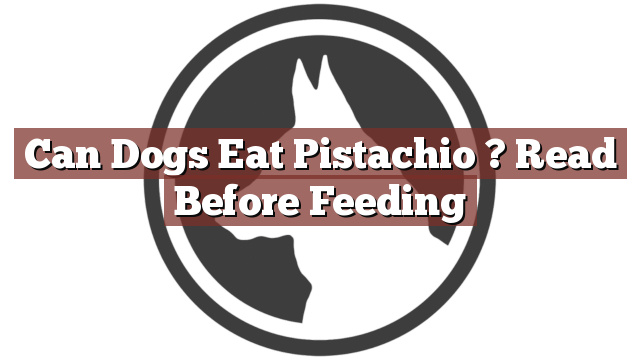Understanding Your Dog’s Dietary Needs
When it comes to feeding our furry friends, it is crucial to understand their dietary needs. Dogs have different nutritional requirements than humans, and certain foods that are safe for us may be harmful to them. As responsible pet owners, it is essential to be aware of what we should and should not feed our dogs. This article will focus on one specific food item: pistachios.
Can Dogs Eat Pistachio? Read Before Feeding
Can dogs eat pistachios? This is a common question among dog owners who may be tempted to share their favorite snack with their furry companion. The answer, however, is no. While pistachios are not toxic to dogs, they can pose several risks to their health.
One of the main concerns with feeding pistachios to dogs is the high fat content. Dogs do not require as much fat in their diet as humans do, and consuming excessive amounts can lead to digestive issues such as diarrhea and upset stomach. Moreover, pistachios often come salted or flavored, which can be harmful to dogs, especially those with pre-existing health conditions like heart or kidney problems.
Pros and Cons of Feeding Pistachios to Dogs
While it is generally not recommended to feed pistachios to dogs, it is important to consider both the pros and cons before making any decisions. On the positive side, pistachios contain several beneficial nutrients, including protein, fiber, and antioxidants. However, these nutrients can be obtained from other dog-friendly foods that are safer and more appropriate for their dietary needs.
On the other hand, the cons of feeding pistachios to dogs outweigh the potential benefits. As mentioned before, the high fat content can lead to digestive issues, and the added salt or flavorings can be harmful to their health. Additionally, pistachios are small and can pose a choking hazard, especially for small breeds or dogs that tend to gulp their food quickly.
Conclusion: Considerations for Feeding Pistachios to Your Dog
In conclusion, it is best to avoid feeding pistachios to your dog. While they are not toxic, the potential risks and lack of significant nutritional benefits make them an unsuitable choice for your furry friend. If you are looking to provide your dog with a healthy and nutritious snack, there are plenty of dog-friendly alternatives available. Always consult with your veterinarian before introducing any new food to your dog’s diet to ensure their safety and well-being. Remember, a well-balanced and appropriate diet is key to keeping your four-legged companion happy and healthy.
Thank you for taking the time to read through our exploration of [page_title]. As every dog lover knows, our furry friends have unique dietary needs and responses, often varying from one canine to another. This is why it's paramount to approach any changes in their diet with caution and knowledge.
Before introducing any new treats or making alterations to your dog's diet based on our insights, it's crucial to consult with a veterinarian about [page_title]. Their expertise ensures that the choices you make are well-suited to your particular pet's health and well-being.
Even seemingly harmless foods can sometimes lead to allergic reactions or digestive issues, which is why monitoring your dog after introducing any new food item is essential.
The content provided here on [page_title] is crafted with care, thorough research, and a genuine love for dogs. Nevertheless, it serves as a general guideline and should not be considered a substitute for professional veterinary advice.
Always prioritize the expert insights of your veterinarian, and remember that the health and happiness of your furry companion come first.
May your journey with your pet continue to be filled with joy, love, and safe culinary adventures. Happy reading, and even happier snacking for your canine friend!

